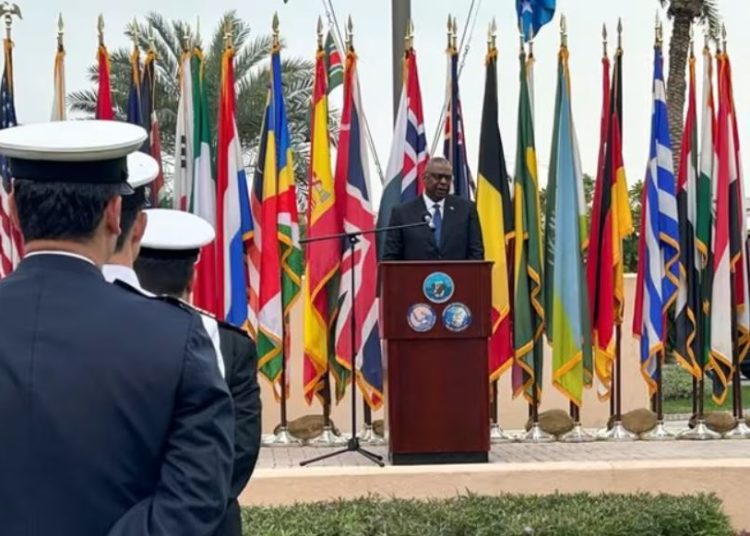The call for a cessation of hostilities directed at Gaza has garnered international consensus, yet the United States appears to be consolidating support for Israel, prolonging the conflict. This can be inferred from the recent diplomatic engagements of Lloyd Austin, the US Secretary of Defense, within Palestine and West Asia.
This week, Secretary Austin made his way to Tel Aviv in a sequence of high-level visits that also earlier saw US National Security Advisor Jake Sullivan in the region. During a joint presser with Israeli Prime Minister Benjamin Netanyahu in Tel Aviv, the Pentagon chief referenced the establishment of a multinational coalition— including the United Kingdom, France, Italy, Spain, Norway, the Netherlands, Canada, Bahrain, and the Seychelles—aimed at countering Yemeni military activities in the Red Sea.
As delineated by the US Secretary of Defense, this naval cadre is set to collaborate through both patrolling operations and intelligence sharing. However, it is evident that the United States is directing efforts to shift a greater portion of the coalition’s financial responsibilities onto its Arab partners in West Asia.
Secretary Austin also visited Manama with an agenda to secure the endorsement of Bahrain for acting as the focal point for the coalition, alongside pressing for a substantial contribution toward the operational costs from the nation.
There is a deliberate attempt by the United States to offload not only the financial and military burdens of the alliance onto regional states but also to parcel out the regional and international political ramifications, all in a bid to lend a veneer of legitimacy to an alliance that rests on questionable grounds.
It is noteworthy that Bahrain stands as the exception among its Arab neighbors; conspicuously absent from the coalition are other key nations previously mentioned by the United States, such as Saudi Arabia, Jordan, the UAE, Qatar, and Egypt, countries that have reportedly declined participation in this pro-Israel coalition. China too has eschewed a response to American overtures in this context.
Adopting regional ambitions as western or international objectives is a longstanding tactic used by the United States to mitigate political, military, and financial expenditures. Its application to the situation in Yemen evidences America’s broader strategic aims, yet it confronts substantial hurdles.
According to sources in Sana’a, Yemen’s central concern is the cessation of the Gaza conflict. The Yemeni armed forces have put forth declarations indicating that a halt in the Gaza warfare would be reciprocated by an equivalent ceasefire against Israeli targets.
Nevertheless, it is discernible that since the initiation of the Gaza conflict, the United States has played a role in extending the hostilities and exacerbating civilian suffering by providing a shield of support for Israel.
The establishment of this maritime alliance represents a strategic pivot, relocating the locus of the crisis from Palestine to the maritime conduit of the Red Sea. Diverting global focus from the conflict in Gaza and the allegations of war crimes by Israel in the strip serves to further the regime’s expansionist and occupational ambitions within Gaza and the West Bank.
In a significant tactical move, the Pentagon has recently redeployed a naval group, spearheaded by the USS Eisenhower aircraft carrier, from the Persian Gulf to the strategic Bab al-Mandeb Strait adjacent to Yemen’s coastline. This maneuver supports a contingency strategy to counter potential offensives by Yemeni military forces.
Harmonious with the United States’ broader military strategy in Western Asia, the nuclear-powered USS Dwight Eisenhower has made a strategic entrance into the Gulf of Aden. The vessel’s primary task is to engage in the mission within the Red Sea.
The possibility of an armed confrontation between American forces and Yemenis could precipitously escalate tensions, creating a highly volatile situation within the region.
The United States’ actions impose additional burdens on both the region and its Western allies, with the intent of reinstating Israel’s waning strategic deterrence. However, such gambles may catalyze further disorder within the geopolitical landscape of Southwest Asia, consequences which may misalign with the interests of both the US and its allied states.






